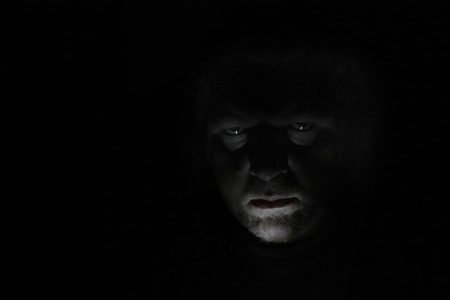The Lie
One of the best-known names in filmmaking for children is that of the late Walt Disney. By bringing to life such great children’s stories as Cinderella, Sleeping Beauty, and Pinocchio, Disney promoted the idea that all your hopes and dreams would come true if you simply wished hard enough, worked hard enough, or received a little help from an outside source—like a fairy godmother.
It was not altogether a bad message, providing we understand that Disney dealt with fairy tales. But it implied that some kind of benevolent force or power exists out there to make our wishes come true. This is an extremely childlike approach to the reality of life; but unconsciously, it has become modern America’s standard understanding of God: that He exists only to make our dreams come true.
That, of course, is a lie. God does not exist to make our dreams come true. Nor does He exist so that we may be fulfilled or happy.
But, you may ask, “Doesn’t God love me so much that Jesus His Son died for me?” Yes, absolutely. God’s love is not the issue. It is our self-image that is the problem: We think we deserve God’s love, believing we are special.
The apostle Paul wrote, “But God demonstrates His own love toward us, in that while we were still sinners, Christ died for us” (Rom. 5:8). The point of this verse is not merely God’s love, but our sin. God loves us despite our sin and the fact that we are sinners. To skip over this aspect of the gospel is to embrace a lie about ourselves that contends we are basically good, merely a little off track; but with God’s help, we can make our dreams come true. This idea is truly a fairy tale.
The Deception
Paul told the Roman church that fallen mankind “exchanged the truth of God for the lie, and worshiped and served the creature rather than the Creator” (1:25). Paul was referring to Genesis 3 in the Garden of Eden, when the serpent deceived Eve and she and Adam ate of the forbidden tree and sinned. What was the nature of the serpent’s deception? It involved three lies: (1) that God’s Word concerning the consequence of death was untrue, (2) that God was not to be trusted and did not have mankind’s best interests at heart, and (3) that man could become like God (Gen. 3:1–7).
The awful result of Adam’s sin was not only that God’s Word was fulfilled, as death then entered the human race, but that mankind’s nature became depraved in heart, mind, and body—total depravity (Rom. 1:18—3:18). Consequently, every-one is born spiritually separated from God, and every concept we have about God and ourselves—apart from God’s revelation of the truth through Jesus Christ—is self-deception and a lie. We are helpless to save ourselves because we not only lack the ability, but we are at the same time self-deceived into thinking that we can save ourselves and that we are not so bad.
Paul wrote that fallen humanity now worships “the creature,” rather than the Creator. The phrase the creature here probably means “created things,” as referred to in Romans 1:23: “an image made like corruptible man—and birds and four-footed animals and creeping things.” Paul, of course, had in mind idolatry, which was rampant in the Roman Empire. We would like to think that, in the Western world, we are past idolatry; some would even like to think we are past “religion.” But if one no longer worships actual idols or an invisible God, all that remains is humanity. Today, in Western circles at least, man is understood as the only savior of mankind. This view is truly self-deception.
The Kosmos
The apostle John referred to “the world” (Greek, kosmos) in a special sense. He did not mean the physical creation per se but, rather, the spirit of the beings in the world—Satan, demons, and mankind—who are in rebellion against God (Eph. 2:1–3). Satan is so deceptive, however, that he either plays on man’s pride to create self-aggrandizing religions or he inculcates the idea that people do not need God and can save themselves, both physically and spiritually.
The essence of this deception is that people are not really sinners (1 Jn. 1:5—2:2). John described “the world” as “the lust of the flesh, the lust of the eyes, and the pride of life” (2:16). This last characteristic, “the pride of life,” is the one that prompts people to say to God, “I don’t need you. I can do it on my own.” This, of course, is the lie from Genesis 3 (cf. Jn. 8:44).
John warned believers not to love the world, for anyone who loves the world does not love God (1 Jn. 2:15). Any notion that we can approach God with any type of essential worthiness of our own is a lie. The wonderful truth, however, is that if we come to Jesus Christ honestly, confessing our personal sin and helplessness, He will forgive and cleanse us based on His work on the cross (1 Jn. 1:9—2:2). But if we do not realize how helpless we really are, we actually minimize the full atonement that Christ has brought through His death.
The danger of Christians thinking that somehow Christ died for us because we deserved to be saved perverts the gospel. Not only does that position minimize our defects as humans, but it also reduces the magnitude of God’s grace to us. The definition of grace is “undeserved favor.” Unfortunately, many people see God’s grace as merited, thinking, We are really good people at heart; we’re only human and not perfect. However, the gospel of Christ is not only that we are separated from God spiritually but that we also are evil, self-deceived, self-centered, selfish individuals who dare think we deserve something from Him.
Beating the Curse
The failure of the “isms” (Communism, Nazism, etc.) in the 20th century initially led to worldwide despair, especially when it looked like a nuclear holocaust was imminent. After all, it seemed evident that mankind was not getting better and better every day. Unfortunately for the Western world, this loss of hope in civilization’s progress was tied to a sort of Christian Postmillennialism, so Western society’s failure to bring peace and progress to humanity was also seen as a failure of the Christian model for Western civilization. Today, in our post-Christian, postmodern world, people have lost hope of finding ultimate truth in Christian morality and scientific progress.
Finding objective truth—something outside of mankind—is now deemed a false hope. So a consortium of science and humanism has replaced objective truth. And this consortium sees mankind as in control of its destiny and scientifically able to eventually defeat the ultimate enemy: death. In this new consortium, religion—or the belief in God or a Savior outside of humanity—is seen as the root of all evil.1
As we saw back in Genesis 3, the consequence of sin is death, not merely spiritual separation from God but also the certainty of physical death. One does not have to probe too deeply into the world of human science to see that the goal today is to “beat the curse.” Through genetic and DNA manipulation, scientists want not only to eradicate disease but ultimately to enable individuals to live forever.2
Of course, reducing human suffering through science has been the calling of the medical profession since Hippocrates. In and of itself, this goal is good. But in the new humanistic model, compassion for humanity is not derived from a respect for individuals as made in the image of God, for there is no God. Rather, it is derived from a purely utilitarian approach: survival.
After Adam and Eve’s fall, God expelled them from the Garden of Eden and so from the Tree of Life. The theology is that God saw that the worst thing for fallen humanity would be to live forever in a fallen state by having access to the Tree of Life. Therefore, it was best that man be driven from the Garden, then given the opportunity to repent and restore his relationship with God, and then die physically with the hope of resurrection to a new, glorified body. Living forever in a fallen body is not salvation. It does not beat death, for fallen man is eternally dead in his heart no matter how long he physically lives.
The Gospel
In explaining the gospel of Jesus Christ (Rom. 1:16–17), the apostle Paul spent the first part of his explanation arguing that “all have sinned and fall short of the glory of God” (3:23). Without understanding not only our spiritual separation from God but also our own depravity, we will never truly understand God’s grace to us. The gospel states that an individual’s faith in Christ’s work of atonement satisfies God’s wrath concerning his or her sin so that these individuals can be justified in God’s sight. Moreover, God also creates in each of them a new person with a new heart through the power of the indwelling Spirit of God. In other words, God’s salvation goes to the root of our problem as humans; it handles not only the guilt of our sin, but also the source of our sin: our depraved hearts.
Our faith in Christ involves the belief that He not only can save sinners through His death, but that He also can make our spiritually dead hearts eternally alive through the power of His resurrection (6:1–11). Believers then look forward to Christ’s coming, when sin and death will be totally eradicated from our lives. God’s salvation ultimately regenerates all of our depravity—our hearts, our minds, and our bodies.
But this is a work of God, by His grace. We do not deserve it, and we can-not accomplish it on our own (Eph. 2:8–9). That is why Jesus Christ is the world’s only hope of salvation. Only the gospel can change men’s hearts.
Fairy tales traditionally are told to children because adults know they are not really true. Unfortunately, the Western world has believed the fairy tale that God not only does not exist, but that mankind is able to save itself. Just as the Tower of Babel was ancient civilization’s attempt to become equal with God, so modern man is attempting to play God. The Bible is clear: just as God judged mankind’s pride at Babel, so will He judge this present world’s rebellion as pictured in the future Babylon (Rev. 17—19). However, despite humanity’s rebellion and wickedness, “God did not send His Son into the world to condemn the world, but that the world through Him might be saved” (Jn. 3:17).
ENDNOTES
- See Richard Dawkins’ works, The God Delusion and The Selfish Gene, whereby he not only dismisses the idea of God as a type of insanity, but determines that mankind’s survival will depend on its own ruthless selfishness.
- See the World Transhumanist Association as detailed by Wesley J. Smith in “The Catman Cometh: Among the Transhumanists,” The Weekly Standard 11, no. 39 (June 26, 2006): 20–24.








I was a student of Dr. Hirt 1994-1995 at IBS.
Keep these articles he wrote circulating. He deserves to be recognized. His theology is sound and his analysis is profound and truthful.
Thank you for not forgetting his influence and gift to those he taught.